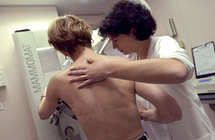
Eighty-four percent of women in the 35 to 49 year age group, which is most affected by the decision, said they had no intention of heeding the panel's advice and would go ahead and have screening mammograms before they reached 50, the USA Today/Gallup poll showed.
Three-quarters of the women surveyed thought the panel's decision was based mainly on a belief that fewer and later mammograms would save money, with only 16 percent saying the recommendations were arrived at after a fair assessment of the risks and benefits of mammograms for women under 50.
Forty-four percent, meanwhile, said they had felt very stressed over at least one mammogram. The task force's report said stress over false positives and unnecessary biopsies was a key factor behind the revised guidelines.
But even among women who said they have had at least one very stressful mammogram, two-thirds said they disagreed with the task force's recommendations.
Doctors and experts were in uproar last week when the new recommendations were issued, and warned that the suggested changes could mean more American women will die from breast cancer, which claims some 40,000 lives each year.
------------------------------------------------------------------------------------------------------------------------------
Three-quarters of the women surveyed thought the panel's decision was based mainly on a belief that fewer and later mammograms would save money, with only 16 percent saying the recommendations were arrived at after a fair assessment of the risks and benefits of mammograms for women under 50.
Forty-four percent, meanwhile, said they had felt very stressed over at least one mammogram. The task force's report said stress over false positives and unnecessary biopsies was a key factor behind the revised guidelines.
But even among women who said they have had at least one very stressful mammogram, two-thirds said they disagreed with the task force's recommendations.
Doctors and experts were in uproar last week when the new recommendations were issued, and warned that the suggested changes could mean more American women will die from breast cancer, which claims some 40,000 lives each year.
------------------------------------------------------------------------------------------------------------------------------









 Home
Home Politics
Politics









